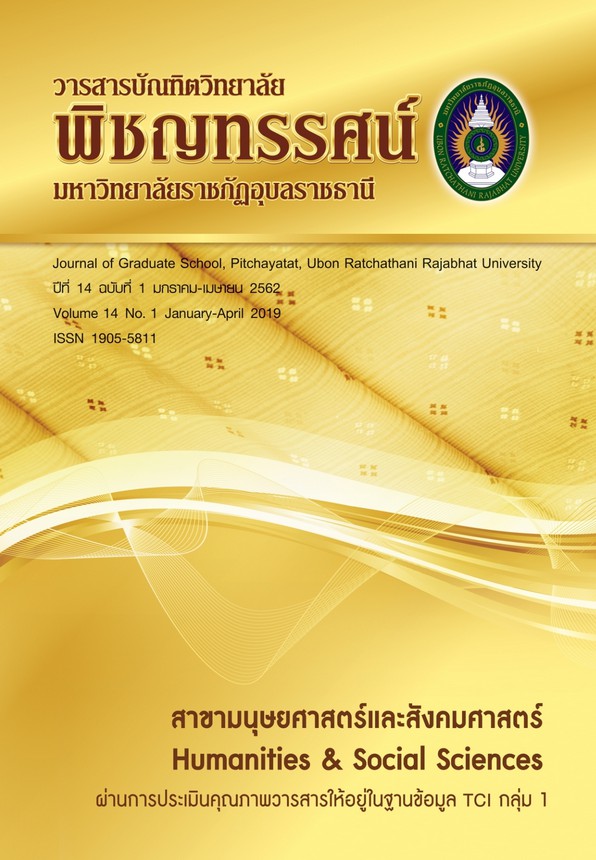การสร้างแบบทดสอบวินิจฉัยวิชาคณิตศาสตร์ เรื่อง ลำดับและอนุกรม นักเรียนชั้นมัธยมศึกษาปีที่ 5 ของโรงเรียนในสังกัดองค์การบริหารส่วนจังหวัดศรีสะเกษ
คำสำคัญ:
แบบทดสอบวินิจฉัยวิชาคณิตศาสตร์, ลำดับและอนุกรม, ข้อบกพร่องของผู้เรียนบทคัดย่อ
การวิจัยนี้มีวัตถุประสงค์เพื่อ 1) สร้างแบบทดสอบวินิจฉัยในการเรียนวิชาคณิตศาสตร์ เรื่อง ลำดับและอนุกรมสำหรับนักเรียนชั้นมัธยมศึกษาปีที่ 5 ของโรงเรียนในสังกัดองค์การบริหารส่วนจังหวัดศรีสะเกษ 2) ตรวจสอบคุณภาพของแบบทดสอบที่ผู้วิจัยสร้างขึ้นในด้านความเที่ยงตรงเชิงเนื้อหา ความยาก อำนาจจำแนก และความเชื่อมั่นของแบบทดสอบ และ 3) ศึกษาข้อบกพร่องของผู้เรียน ในการเรียนวิชาคณิตศาสตร์ เรื่อง ลำดับและอนุกรมสำหรับนักเรียนชั้นมัธยมศึกษาปีที่ 5 ของโรงเรียนในสังกัดองค์การบริหารส่วนจังหวัดศรีสะเกษ กลุ่มตัวอย่างที่ใช้ในการวิจัยครั้งนี้เป็นนักเรียนชั้นมัธยมศึกษาปีที่ 5 ที่เรียนอยู่ในภาคเรียนที่ 2 ปีการศึกษา 2560 ของโรงเรียนในสังกัดองค์การบริหารส่วนจังหวัดศรีสะเกษ จำนวน 440 คน ที่กำหนดโดยวิธีการสุ่มแบบหลายขั้นตอน เครื่องมือที่ใช้ในการเก็บรวบรวมข้อมูลสร้างมาจากแบบทดสอบเพื่อสำรวจจุดบกพร่องในการเรียนชนิดเติมคำแบ่งเป็น 5 ฉบับ แล้วนำข้อบกพร่องมาสร้างตัวลวงในแบบทดสอบวินิจฉัย ทำการทดสอบวินิจฉัย 3 ครั้ง ครั้งที่ 1 และ ครั้งที่ 2 ทดสอบกับกลุ่มตัวอย่างครั้งละ 100 คน โดยในแต่ละครั้งคัดเลือกข้อสอบที่เข้าเกณฑ์ไว้ก่อนนำไปทดสอบครั้งต่อไปเพื่อหาค่าความยากและค่าอำนาจจำแนกรายข้อ และตัดข้อสอบที่ไม่เข้าเกณฑ์แล้วเลือกข้อสอบที่เข้าเกณฑ์ไว้ใช้ในครั้งที่ 3 จำนวน จำนวน 5 ฉบับ ซึ่งมีข้อสอบฉบับละ 10 ข้อ โดยใช้กลุ่มตัวอย่างจำนวน 440 คน นำข้อมูลมาวิเคราะห์ เพื่อหาคุณภาพของแบบทดสอบในด้านความเที่ยงตรงเชิงเนื้อหา ค่าความยาก ค่าอำนาจจำแนก และค่าความเชื่อมั่นของแบบทดสอบทั้งฉบับ สถิติที่ใช้ในการวิเคราะห์ข้อมูลได้แก่ ร้อยละ ค่าเฉลี่ย และ ส่วนเบี่ยงเบนมาตรฐาน ผลการวิจัย พบว่า 1. แบบทดสอบวินิจฉัยวิชาคณิตศาสตร์ เรื่อง ลำดับและอนุกรม ชั้นมัธยมศึกษาปีที่ 5 มีลักษณะเป็นแบบเลือกตอบ 4 ตัวเลือก จำนวน 5 ฉบับ ฉบับละ 10 ข้อ ดังนี้ ฉบับที่ 1 ความรู้เกี่ยวกับลำดับ ฉบับที่ 2 ลำดับเลขคณิต ฉบับที่ 3 ลำดับเรขาคณิต ฉบับที่ 4 อนุกรมเลขคณิต และ ฉบับที่ 5 อนุกรมเรขาคณิต รวมแบบทดสอบวินิจฉัยที่สร้างขึ้นทั้งหมด 50 ข้อ 2. แบบทดสอบทั้ง 5 ฉบับ มีค่าความยากรายข้อตั้งแต่ 0.53–0.66 ค่าอำนาจจำแนกรายข้อตั้งแต่ 0.26-0.94 ค่าความเชื่อมั่นทั้ง 5 ฉบับซึ่งคำนวณโดยใช้สูตรไบโนเมียล มีค่าเป็น 0.78, 0.76, 0.73, 0.77 และ 0.75 ตามลำดับ ค่าความเที่ยงตรงเชิงเนื้อหาของแบบทดสอบ ทั้ง 5 ฉบับ มีค่าความสอดคล้องระหว่างข้อคำถามกับวัตถุประสงค์ ตั้งแต่ 0.80 -1.00 และมีจุดตัดซึ่งคำนวณตามวิธีของแกลสส์ คะแนนจุดตัดของแบบทดสอบทั้ง 5 ฉบับมีค่า 3, 4, 3, 4 และ 5 ตามลำดับ และมีร้อยละของการสอบผ่านแต่ละฉบับเป็น 94.09, 74.77, 63.64, 67.72 และ 62.73 ตามลำดับ 3. การวิเคราะห์จุดบกพร่องที่นักเรียนตอบผิดมากที่สุดในการทำแบบทดสอบวินิจฉัยทางการเรียน เรื่อง ลำดับและอนุกรม พบว่า นักเรียนบกพร่องคือไม่เข้าใจกระบวนการหาพจน์ทั่วไป (พจน์ที่ n) ของลำดับ และ ขาดความเข้าใจสูตรการคำนวณ (Sn) ของอนุกรม
เอกสารอ้างอิง
กระทรวงศึกษาธิการ. หลักสูตรการศึกษาขั้นพื้นฐาน พุทธศักราช 2551. กรุงเทพฯ: โรงพิมพ์คุรุสภาลาดพร้าว, 2551.
กัญวลัญช์ จิตรดี. การสร้างแบบทดสอบวินิจฉัยวิชาคณิตศาสตร์ เรื่องตัวประกอบของจำนวนนับสำหรับนักเรียนชั้นประถมศึกษาปีที่ 6 สังกัดสำนักงานเขตพื้นที่การศึกษาประถมศึกษา. วิทยานิพนธ์วิทยาศาสตรมหาบัณฑิต มหาวิทยาลัยบูรพา, 2559.
ณัฐวิภา สุดแท้. การสร้างแบบทดสอบวินิจฉัย เรื่องการบวกและการลบ กลุ่มสาระการเรียนรู้คณิตศาสตร์ สำหรับนักเรียนชั้นประถมศึกษาปีที่ 4 สังกัดสำนักงานเขตพื้นที่การศึกษาประถมศึกษามหาสารคาม เขต 1. วิทยานิพนธ์ปริญญาครุศาสตรมหาบัณฑิต มหาวิทยาลัยมหาสารคาม, 2559.
ธีรารัตน์ นาชัยฤทธิ์. การสร้างแบบทดสอบวินิจฉัยทางการเรียนคณิตศาสตร์สำหรับนักเรียนชั้นประถมศึกษาปีที่ 4 เรื่องการคูณและการหารจำนวนนับ. วิทยานิพนธ์ศึกษาศาสตร์มหาบัณฑิตมหาวิทยาลัยรามคำแหง, 2550.
บุญชม ศรีสะอาด. การวิจัยเพื่อแก้ปัญหาและพัฒนาผู้เรียน. กรุงเทพฯ: สุวีริยาสาส์น, 2553.
พร้อมพรรณ อุดมสิน. การวัดและการประเมินผลการเรียนการสอนคณิตศาสตร์. พิมพ์ครั้งที่ 3 (ฉบับปรับปรุงแก้ไข). กรุงเทพฯ: คณะครุศาสตร์ จุฬาลงกรณ์มหาวิทยาลัย, 2545.
ไพศาล วรคำ. การวิจัยทางการศึกษา. พิมพ์ครั้งที่ 2. มหาสารคาม: ตักสิลาการพิมพ์, 2554.
วิสารัตน์ วงศ์ภูรี. การสร้างแบบทดสอบวินิจฉัยจุดบกพร่องในการเรียนวิชาคณิตศาสตร์ กลุ่มสาระการเรียนรู้ คณิตศาสตร์ สำหรับนักเรียนชั้นประถมศึกษาปีที่ 6 สังกัดสำนักงานเขตพื้นที่การศึกษาประถมศึกษาขอนแก่น เขต 3. มหาสารคาม: มหาวิทยาลัยราชภัฏมหาสารคาม, 2556.
สมนึก ภัททิยธนี. เทคนิคการสอนและรูปแบบการเขียนข้อสอบแบบเลือกตอบวิชาคณิตศาสตร์เบื้องต้น. พิมพ์ครั้งที่ 3. กาฬสินธุ์: ประสานการพิมพ์, 2553.
สุมานี กลิ่นพูน. การสร้างแบบทดสอบวินิจฉัยในการสร้าง วิชาคณิตศาสตร์เรื่อง โจทย์ปัญหาเศษส่วน ชั้นมัธยมศึกษาปีที่ 6. มหาสารคาม: มหาวิทยาลัยราชภัฏมหาสารคาม, 2555.
สำนักวิชาการและมาตรฐานการศึกษา, กระทรวงศึกษาธิการ. แนวปฏิบัติการวัดและประเมินผลการเรียนรู้ตามหลักสูตรแกนกลางการศึกษาขั้นพื้นฐานพุทธศักราช 2551. พิมพ์ครั้งที่ 2. กรุงเทพฯ: โรงพิมพ์ชุมนุมสหกรณ์การเกษตรแห่งประเทศไทย จำกัด, 2553.
Adams, Georgia S. and Theodore, Torgerson L. Measurement and Evaluation in Education Psychology and Guidance. New York: Holt, Rinehart and Winston, 1964.
ดาวน์โหลด
เผยแพร่แล้ว
รูปแบบการอ้างอิง
ฉบับ
ประเภทบทความ
สัญญาอนุญาต
บทความทุกเรื่องได้รับการตรวจความถูกต้องทางวิชาการโดยผู้ทรงคุณวุฒิภายนอกอย่างน้อย 3 คน ความคิดเห็นในวารสารพิชญทรรศน์เป็นความคิดเห็นของผู้นิพนธ์มิใช่ความคิดเห็นของผู้จัดทำ จึงมิใช่ความรับผิดชอบของวารสารพิชญทรรศน์ และบทความในวารสารพิชญทรรศน์สงวนสิทธิ์ตามกฎหมายไทย การจะนำไปเผยแพร่ต้องได้รับอนุญาตเป็นลายลักษณ์อักษรจากกองบรรณาธิการ





